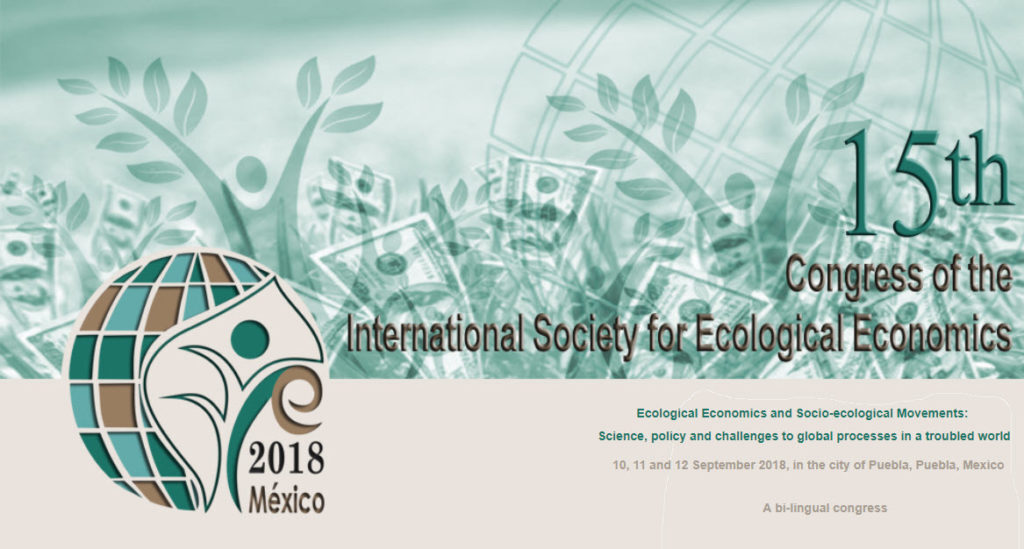15th Congress of the International Society for Ecological Economics
10, 11 and 12 September 2018, in the city of Puebla, Puebla, Mexico
A bi-lingual congress
Ecological Economics and Socio-ecological Movements:
Science, policy, and challenges to global processes in a troubled world

This XV Biennial conference of the International Society for Ecological Economics invites participants to explore the ways in which the field is contributing to strengthen our collective ability to meet the challenges posed by the early warnings about the limits to growth and threats to biodiversity while also attending the universally recognized rights of peoples to their self-determination. Over the past quarter century since the ISEE was founded the international community has developed a substantial corpus of law and agreements that recognize our collective responsibility to attend to these serious problems while recognizing the extraordinary diversity of societies in our midst. Our colleagues are engaged in significant efforts to identify and understand the underlying obstacles to implementing effective policies that address the limitations of existing institutions while also searching for new approaches to overcome these problems.
In this vein, we have identified a number of important international issues that Ecological Economists are examining as part of our collective effort. Five problems of particular importance identified by our colleagues are:
- International capital movements to control natural endowments (land, water, and energy grabbing; biopiracy; ecologically unequal trade)
- International migration in response extreme differences among regions and peoples.
- Continuing excessive emissions of greenhouse gases at world level in spite of international efforts to reverse the historical trend, combined with remarkable changes in the energy matrix of some countries.
- Concentration of wealth, income, and appropriation of environmental endowments that give rise to conflicts over distribution and provoke “resistance” movements.
- Threats to biodiversity and the ability of the planet to sustain its natural processes.
While not exhaustive, a considerable number of members of the ISEE are engaged in research on these matters. The lack of flexibility of existing institutions in most countries and the capture of many international organizations by entrenched interests (selling uncritical notions of ecological modernization, “sustainable development”, the “circular economy”) are generating complex obstacles for people searching for solutions to clearly identified problems; social and political conflict is intensifying around the world. At the same time, we are discovering that peoples around the world are adopting alternative ways to organize themselves, forging new models of “good living”, oftentimes choosing to live at the margins of their societies rather than open themselves to outside environmental and economic exploitation, and to internal and external colonialism. Ecological economists are discovering that these peoples have much to teach us about possible alternative paths to addressing the challenges. In the terminology of Karl Polanyi, they refuse to be incorporated into the “generalized market system”. Mexico is one of the countries of the world where such social experiments are influential and widespread.
The 2018 ISEE conference invites colleagues examining the problems facing the international community to explore solutions with others engaged in strengthening the myriad of socio-ecological grassroots organizations. By focusing on such interactions among these different communities, we hope to contribute to our goals advancing our understanding of today’s pressing problems while exploring solutions offered by people outside of the traditional circles of influence. In academic terms, we search at the same time for a cross-fertilization between ecological economics and political ecology, ethnoecology, agroecology, energy systems.
Within this frame of reference, we invite participants to consider organizing their contributions to the discussion within the following general themes:
- Ecological Economies: How does transdisciplinarity respond to diverse socio-ecological contexts?
- Applications of concepts built from the bottom-up: ecological debt and others
- Ecosystem services, biodiversity conservation, biophysical measurements, metabolisms
- Valuation languages and tools of measurement: legal and social processes; incentive instruments; multi-criteria evaluation.
- Energy transitions
- Social and environmental conflicts; environmental justice
- The economy of care and eco-feminist economics
- Imaging future societies: What does “Good living” mean?
- Ecological macro-economics: prosperity without growth; degrowth; and other ideas
- Feeding 9 billion humans: Food security or food sovereignty? rural-urban transitions.
- Measuring and acting in view of globally diverse inequities: gender, indigenous rights, environmental space appropriation, etc.
- Ecological Economics as a paradigm to support grassroots alternatives: agroecology, solidarity economies, and markets, alternative currencies, workers’ control.
The formal call for proposals and papers will be distributed in September 2017. For enquiries and support in the organization of the event, please write us at ISEE2018@correo.xoc.uam.mx.


3 Responses
Send me uodates about confernence
The website will be updated with the information as it becomes available. If you have questions you can email ISEE2018@correo.xoc.uam.mx.
send key dates about conference